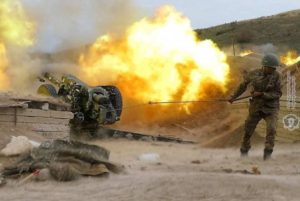
Artsakh is the tomb of the Neo-Ottoman Empire
23 OCTOBER 2020
NATAN BEDROSSIAN
Recently we have seen the adventures of Turkish President Erdogan in the Mediterranean region, in search of a goat in the sea areas dominated by the Cypriots, violating Greek sovereignty and directly intervening in the Libyan civil war, with a military presence in Syria, with air strikes on Iraq’s borders.
To all this should be added the direct intervention of Turkey in the military offensive launched by Azerbaijan on Artsakh on September 27, with the transfer of mercenaries from Libya and Syria to Azerbaijan and the realization air strikes by the Turkish Air Force during the attack and by other means.
Here, a sixth front has been added to the Turkish military operations, but why all this and why at this time?
Anyone who follows the news, especially recent developments in Turkey and Azerbaijan, will notice that the administrations of both countries face various challenges domestically.
The Turkish economy has been hit hard by the Turkish government’s bellicose foreign policy, with Turkish gold depreciating, inflation rising 12%, unemployment 13.49% and 58 years of foreign debt. Moreover, according to studies carried out by non-governmental organizations, the standards of freedom of expression and journalism in Turkey have markedly and considerably decreased.
All of this has led to a decline in the popularity of President Erdogan and his party. According to a survey conducted by Artibir in April 2020, Erdogan’s popularity reached 40.1%, and that of his party, according to a survey conducted by AKAM in August 2020, to 36.9%.
And surveys of non-governmental organizations linked to the Azerbaijani administration show that arrests of opposition figures, parties and journalists have increased in Azerbaijan and that the country is not free.
In order to alleviate all internal grievances and save its allied administration, Turkey has supported Azerbaijan’s military action against Armenia and Artsakh, opening a new front in its foreign military operations.
Either way, all efforts to make Artsakh a testing ground for neo-Ottomanism are in vain, for we all witnessed the February 1988 movement and the liberation struggle that followed, the four-day war of 2016, and today we are witnessing the popular resistance of Artsakh against the Azeris. :
It is no exaggeration to say that the continuation of the two administrations (Erdogan and Aliyev) depends on the attack on Artsakh, its failure could increase popular discontent with the Aliyev administration and, more On the other hand, it could lead to the defeat of the Turkish foreign front.
Therefore, Artsakh is the cemetery of neo-Ottomanism, where, in the spirit of its popular resistance, the will to survive, the determination to take possession of the land, as well as the support of Armenia and all the Armenians, will defeat and fail the occasional and renewed dream of the sultans.

aztagdaily.com/archives/487122
English translation – LOUSAVOR AVEDIS:
